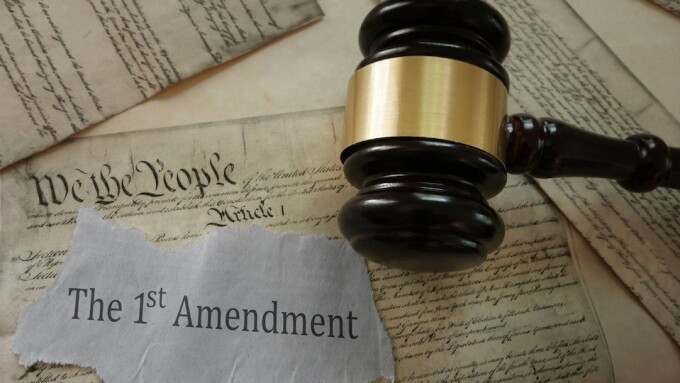PHILADELPHIA, Pa. — Friday morning, lawyers for the Free Speech Coalition (FSC) and the other plaintiffs in the years-long litigation challenging the constitutionality of 18 U.S.C. § 2257, known more commonly in the adult industry as “2257,” filed their response to last month’s opening brief by the U.S. Department of Justice (DOJ) before the U. S. Court of Appeals for the 3rd Circuit.
The attorneys for the plaintiffs (called in this stage "appellees/cross-appellants"), J. Michael Murray and Lorraine R. Baumgardner, argued that 2257 — described by the FSC as “a federal record-keeping law aimed at preventing the use of minors in adult productions” — does not serve a “compelling governmental interest,” is not “narrowly tailored” to provide such a service and does not provide the “least restrictive” way to reach that outcome.
Last August, U.S. District Judge Michael Baylson in Philadelphia gave the FSC and co-plaintiffs a partial victory, finding that large parts of 2257 were unconstitutional on First Amendment grounds. The plaintiffs had also obtained an earlier victory on Fourth Amendment grounds from a 3rd U.S. Circuit ruling.
The Justice Department appealed Judge Baylson’s final judgment and decree late last year. The DOJ filed its brief on March 27th.
On Friday, FSC attorney Murray alleged that the plaintiffs’ partial August victory was in fact incomplete (Judge Baylson had upheld two provisions), since given that 2257 “failed the narrow tailoring and least restrictive means components of strict scrutiny,” the lower court “erred in not striking down the Statutes in their entirety.”
Murray also argued in favor of the FSC and another plaintiff having standing to bring forth the challenge, and for the claim that implementation of 2257 regulations is “unconstitutionally overbroad,” or too imprecise to achieve the stated goal.
Murray acknowledged that the plaintiffs agreed with the DOJ that the government’s “interest in protecting children from sexual exploitation is compelling.” However, the brief continued, citing precedent, that “strict scrutiny requires the Government to come forward with evidence demonstrating the existence of the problem the Statutes claim to address — minors being used by adult film makers in the production of sexual images — and that regulation of constitutionally protected speech depicting adults will eliminate that problem.”
For Murray, “the Government produced evidence of neither."
As the FSC has previously explained, the 2257 requirements (i.e., that anyone who films sexual content must “maintain and keep detailed records and IDs of the persons depicted in the film, cross-referenced in files, with dates of production, nicknames and copies of the movies,” etc.) do not achieve their stated goal.
“This isn’t about keeping minors out of adult film,” the FSC website explains to newer producers. “The industry is already incredibly stringent about age-verification, as the production of child pornography is not only morally and ethically despicable, it also carries a mandatory minimum of fifteen years in prison. A record-keeping requirement means nothing to a child pornographer. But for legitimate producers, the burdensome and byzantine requirements create numerous ways for producers to be prosecuted and harassed by law enforcement, that have nothing to do with the age of performers.”
As to the vagueness or “unconstitutionally overbroad” nature of the 2257 provisions, the FSC attorneys’ brief argued that the statutes “flunk” that test, since they “burden a significant body of expression that is far removed from the exact source of the problem they seek to remedy.”
The imprecisely phrased requirements for record-keeping, according to the plaintiffs’ argument, could potentially be applied to all sexually explicit images, “including private, noncommercial depictions created and viewed by adults in their homes” and even the “substantial amount of private sexually explicit images shared between adults on their cell phones.”
Last month’s brief filed by the DOJ argued that 2257 is a valuable tool to combat “child pornography.”
Challenging Judge Baylson, the DOJ claimed that the judge's ruling “guts the statutory scheme Congress designed to prevent the victimization of minors in the production of pornography.” 2257, according to the federal government’s lawyers, was meant to be “only the first step of a comprehensive age verification system that operates at every level of pornography production.”
The DOJ also made the rather strange argument that the plaintiffs are “highly atypical” porn producers, since they are “artists, journalists, and educators who depict youthful models, but have no pronounced preference for producing images depicting the young or very young.” According to the U.S. government, citing supposed evidence on record before the district court, there is “a strong market preference for pornographic images showing the sexual activity of individuals who look young or extremely young."
The DOJ is apparently engaging in a very peculiar and idiosyncratic simplification of the extremely complex universe of recorded sexual expression, as any tube site data set or sophisticated category-based algorithm can attest.
In another unusual statement that should worry freedom-of-expression advocates and social libertarians alike, the DOJ argued in favor of enforceable federal regulation by claiming that “when Congress chose to implement an effective, verifiable method for distinguishing legal pornography from child pornography, it had no obligation to rely on pornography producers to police themselves."
This morning’s response brief by the attorneys for the FSC and the other plaintiffs, firmly re-stating their challenge to 2557’s constitutionality, reflected the adult industry trade association’s mission to fight “nonsensical laws and regulations, to prevent government overreach, and protect performer privacy.”
For more XBIZ coverage of 2257, click here.
View 2557 Appeal: PRINCIPAL AND RESPONSE PROOF BRIEF OF APPELLEES/CROSS-APPELLANTS (April 26, 2019)




